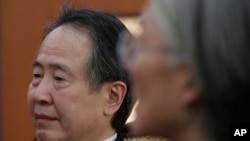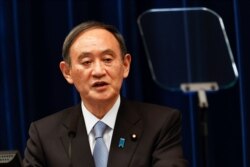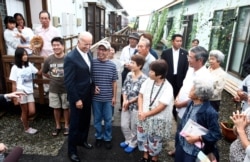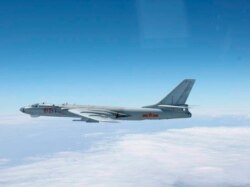The need for a stronger U.S.-Japanese alliance and a “free and open” Indo-Pacific region will be top issues at Friday’s Washington summit between U.S. President Joe Biden and Japanese Prime Minister Yoshihide Suga, according to Japan’s ambassador to the United States.
Japan is “honored” that Suga will be the first foreign leader to hold a face-to-face meeting with Biden since the latter took office, Ambassador Koji Tomita said in written replies to questions from VOA. He predicted a warm personal rapport between the two leaders, both of whom hail from humble childhoods.
Tomita said Japan is “very encouraged” by Biden’s active engagement in the Indo-Pacific region, citing last month’s virtual Quad Summit in which Biden hosted the leaders of Japan, Australia and India.
“The international order is being challenged in various ways, so we hope to continue having specific discussions on the ways that Japan and the U.S. can take initiative in realizing our shared vision,” he added.
The Japanese envoy said he sees similarities between the two leaders. Suga, like Biden, is “a leader who did not inherit a political support network and had to build up his career through politics by themselves,” he said.
The Japanese prime minister is known to have grown up on a strawberry farm in rural Japan, whereas Biden hails from Scranton, Pennsylvania, known historically as a coal mining center.
“Suga’s strength is that he understands the life of ordinary citizens and feels their joy and pain,” Tomita said. “These shared personal traits will lead to a solid rapport, which will allow them to tackle the tough questions that they must face together.”
Tomita said many Japanese remember the warmth Biden showed when he visited their country after a devastating earthquake in 2011. “I was actually there for that visit, and I greatly appreciated the way that he consoled victims and gave them a sense of hope,” the ambassador said.
On the policy front, Tomita said Japan fully supports the multilateral approach the Biden administration has touted, as well as the U.S. president’s efforts “associating climate policy with economic growth realized through new investment, job expansion and innovation.”
But topping the agenda for the White House meeting will be discussions about a coordinated strategy to strengthen the formal alliance between the two countries, he said, noting that “the security environment in the (Pacific) region has become increasingly severe.”
It has been widely reported that Japan has taken a more proactive approach to regional security and on issues concerning human rights in China than in past years.
In explaining the new posture, Tomita said, “As the strategic environment around Japan has become increasingly complex and uncertain, we need to utilize an increasingly complex set of policy responses, using everything in our diplomatic and security toolkits.”
China’s growing economic and military influence “is an important part of this changing landscape,” Tomita said, while quickly adding that “our approach, including our growing partnership with the Quad, is not directed toward any specific country.”
Japan’s “strategic goal has always been to maintain the peace and prosperity of the entire region. In this regard, the importance of the Japan-U.S. alliance has never been greater,” Tomita said.
“Japan places importance on multilateralism and aims to realize a ‘united world’ that collectively tackles challenges facing the international community,” he added.
While subsequent U.S. administrations have described China under Communist Party rule as by turns an “adversary” and a “competitor,” Japan prefers to not label Beijing, at least for now.
“While China is a growing topic in Washington, D.C., these days, I can assure you that as a country situated nearby, China is always a big presence for Japan,” Tomita said.
“With the world’s second largest economy, and a population of 1.4 billion, I think that China actually has the capacity and the responsibility to make positive contributions to efforts to solve global issues.”












